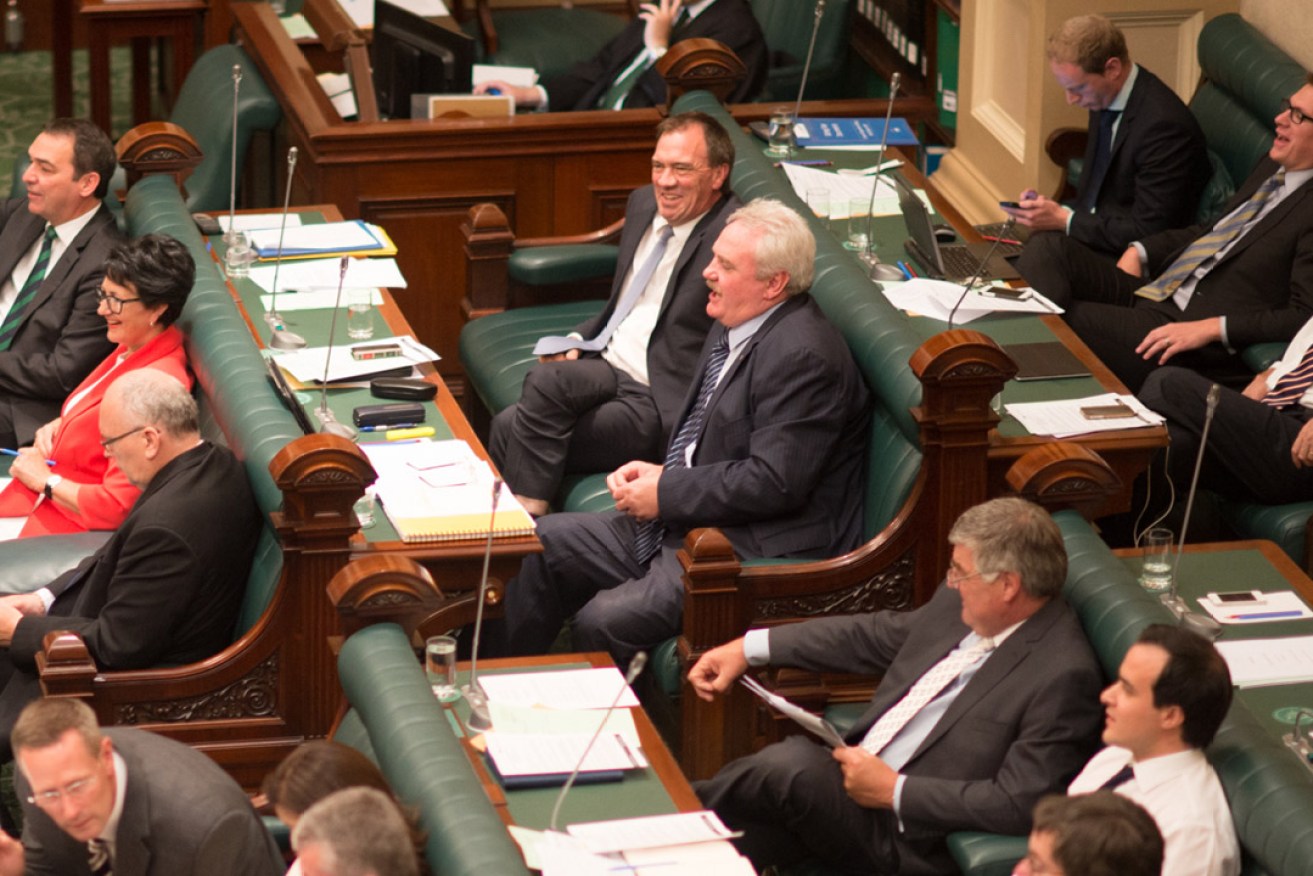Off the Bench: We need more women in politics
In our opinion series Off the Bench, two of South Australia’s brightest backbench MPs trade arguments on key issues. Today, Liberal Stephan Knoll says quotas are not the answer to increasing the number of women in politics; tomorrow, Labor MP Chris Picton will respond.

'No entrenched bias': Liberal MPs (including Stephan Knoll, far right) in State Parliament.
Across Australia, women make up 32 per cent of parliamentarians and 20 per cent of cabinet ministers.
A diversity of views helps our parliament to make more complete decisions; it enables the parliament to be more representative of the society we live in.
The corporate-sector experience indicates that gender-diverse management teams improve productivity, customer service and financial returns.
At a time when confidence in our political system needs improvement, ensuring that our parliaments can relate better to the communities they represent is essential.
As a younger person from a small-business background, I have not witnessed entrenched sexism. My experience through university and the workplace has been one where men and women are on an equal footing using talents and wits to get ahead.
In the family business, we could not afford to show bias; all available talent was needed to help the business survive and grow.
I’ve seen no entrenched bias in the Liberal Party, either. Apart from our party’s state executive having roughly equal numbers, last year I witnessed Nicola Centofanti, a veterinarian from the Riverland, get elected as our first vice-president only weeks before giving birth to twins.
However, we do have a persistent problem. After having the first female Member of the House of Assembly in South Australia, Joyce Steele, elected in 1959, we haven’t come far enough as a party, nor, more generally, as a parliament.
I am certain that Labor MP Chris Picton, in his rejoinder, will point out his party’s success in this area. But while the state parliamentary Labor Party may be 35 per cent women, this has not translated to cabinet, with only three women out of 14 ministers.
Labor’s key tool in improving female participation involves the use of quotas to mandate a percentage of winnable seats be reserved for women. This approach is anathema to the vast majority of Liberals and fair-minded Australians because it does not deal with the underlying causes and it goes against the ideals of competitive fairness, merit and reward for effort.
Quotas leave doubts about whether the candidate selected was indeed the best person for the job.
We need to promote equality of opportunity over equality of outcome. Parliaments and political parties should be focussing on encouraging opportunities for women instead of segregating them.
Instead of quotas, parties need to set goals and targets, something that has been promoted in a paper, Gender and Politics, published by the Menzies Research Centre and authored by Nick Cater and South Australian Nicolle Flint. This paper has helped form thinking in the area and is extensively referred to throughout this article. Setting goals and reporting mechanisms around increased female participation will focus our collective efforts on the barriers that exist. Targets will also work from the ground up to bring about genuine culture change that includes everyone in the problem and in potential solutions.
A key to success will be sponsors and mentors: men and women working one-on-one to help change the dynamic and provide support for women seeking to advance. Those who have gone before possess valuable experience to help others climb and, again, will give ownership to a group of people that can help effect change.
As a man, I feel a sense of unease in tackling this topic and, while we do need women to drive this agenda, we also need men to get on board and be part of the solution. This is a point made by actress Emma Watson’s #heforshe campaign.
We also need to respect women’s choices. In all the commentary on this topic, I have never seen the collective question asked: do women want to go into politics in the first place? True equality will occur only when women have the same opportunities as men, and also when their decisions on careers, family and balance are valued and celebrated.
For this problem to be fixed, we need grassroots culture change in our political parties.
Quotas, while trying to achieve the right outcome, can create frustration and perhaps set back the wider cause. By setting targets and reporting mechanisms to track performance, we have a greater chance of achieving natural parity; a chance for an inclusive process where a woman’s success is commonplace and where more women will take their place in positions of power, blind of gender and free from bias.
Stephan Knoll is the member for Schubert. Chris Picton is the Member for Kaurna.




